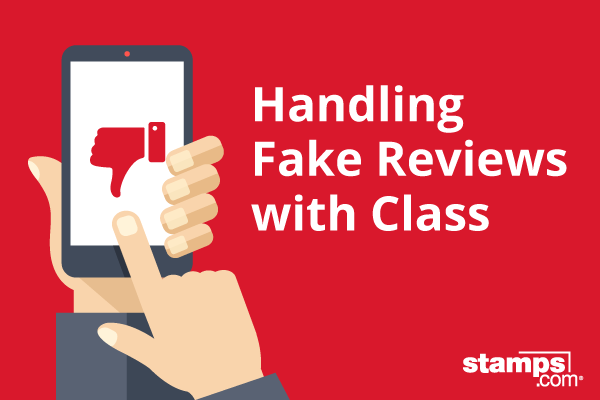Handling Fake Competitor Reviews with Class

No business is perfect. At some point, an employee will make a mistake or a customer won’t be satisfied and you’ll end up with an unflattering review. But if you reach out and fix the problem, you may be able to turn that bad review around.
Unfortunately, not all negative reviews are legitimate. In fact, some criticism could be entirely fabricated by your competitors with the intention of tarnishing your hard-earned reputation. The worst part is that research suggests small businesses could lose 22% of their revenue from just one bad online article. Continue reading to learn how to identify and address fake reviews before they ruin your reputation.
Spotting Fake Reviews
It may seem impossible to root out false reviews, but with a few simple tricks you’ll become a pro at catching the counterfeits.
Start by keeping thorough records of every online review mentioning your business. You may want to reference the good ones with customers, and you’ll definitely need to address the bad ones to maintain a clean reputation.
Create a spreadsheet and add columns for each of the following: website address, review, review type, review date, and notes. Next, you’ll want to categorize each review type as positive, neutral or negative. Then, fill in the notes column with any details, including incidents on record or whether you’ve reached out to the individual or website. Finally, open and read each critique and look for these signs of fake reviews:
- Vagueness — If someone has never been to your store or done business with your company their review may lack detail. Legitimate complaints usually include a name or description rather than generic statements like: “rude and dishonest salespeople.”
- Me, Me, Me — Deceptive reviewers often default to using more first-person pronouns like “I” and “me”. This is because our brains tend to draw from what we know (ourselves) when fabricating stories.
- More Doing, Less Seeing — When asked to describe real events, people remember the things they saw and touched. Conversely, when we lie, we usually describe actions because they’re easier to make up.
Reporting Fake Reviews
Once you’ve identified fake reviews it’s time to take action. Unfortunately, many review sites won’t remove complaints unless you can definitively prove that they’re fictitious. But if you gather plenty of evidence to support your claims then they may be willing to help. Try locating sales records and email exchanges, and compare the location of the reviewer to your business address.
While ripoffreport.com won’t remove complaints, reputable sites like Yelp, Google and Facebook are willing to look at dishonest content. Each site has specific guidelines for removing reviews, though, so you should become familiar with individual policies before submitting a grievance.
Responding to Fake Reviews
While removing false reviews should always be your goal, sometimes this just isn’t possible. In these situations, you should submit a rebuttal or response to clarify the situation with readers. However, you’ll need to word your reply carefully so you don’t cause more damage to your reputation. Here are some tips to respond to fake reviews with class:
- Be Patient — Before responding to a fake review, wait to see if it subsides in your search results. Sometimes reviews fall to page 2 or 3 in Google where they won’t be seen. However, responding to them could signal to Google that the content is relevant to your brand, pushing them higher up in the search results.
- Cast Doubt — Calmly explain that you have no record of an incident that matches the reviewer’s name or situation. State that you take customer service very seriously, and offer to resolve the issue over the phone or via email. Readers may doubt the authenticity of the complaint, and you’ll demonstrate your willingness to fix issues.
- Talk to the Readers — The author of the fake review will probably never read your response. Therefore, respond in a way that you want potential readers of the complaint to see your company. Using facts and bullet points can also help to build your case.
Fake reviews are frustrating and costly, but you don’t have to live with them. Fighting back with class and a strategic plan could be enough to fix your reputation. If you’re still unsuccessful and have the budget, you can turn to more traditional methods like digital marketing and PR to eradicate the negative content. But these techniques often require a substantial long-term investment.
Here’s a quick recap of that strategy again: Record all online reviews about your business. Learn to sniff out fake reviews. Remove what you can, and always respond with the reader in mind. Following this advice will put you on the path to developing a shining reputation for your small business.
Jonas Sickler is an expert in crisis communications and online reputation management. His advice has been featured in over 60 publications, including Forbes, Washington Post, CNBC, The Street, U.S. News and Business News Daily. Follow along on Twitter.